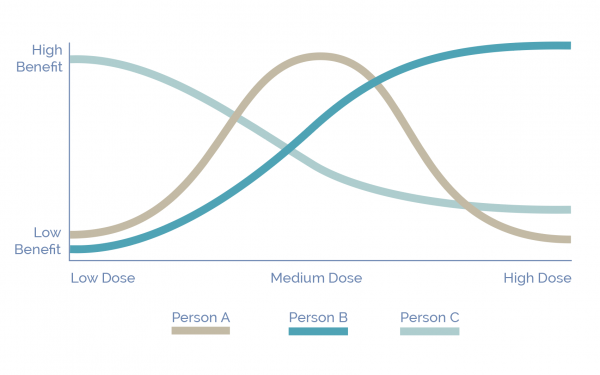The Biphasic Effect Explained
The biphasic effect makes certain compounds — including CBD, caffeine, and alcohol — have an opposite effect depending on whether you take smaller or larger amounts. This means it’s important to find the right dose for you personally.
Mary can take one hit from a joint and feel relaxed, but if she smokes the entire thing at once she’ll probably get a panic attack. Mary’s best friend, Jane, can have a 3 cocktails and dance on a bar…but if she has a fourth drink she’ll start falling asleep. This is due to the biphasic effect.
Many compounds, including cannabis, alcohol, and caffeine, are biphasic. This means low and high doses can produce somewhat opposite results. In other words, a small dose may have one effect, where a high dose may have the opposite outcome. Finding your optimal dose is crucial and requires patience and time.
The Biphasic Effect and CBD
Some people find small doses of CBD – sometimes as little as 10-20mg – make them more energetic and clear-headed, while larger doses can be relaxing or make them sleepy. Others find higher doses – even hundreds of milligrams at a time – calm them and counteract anxiety while small doses do little if nothing at all. So how can you find the best dose for your body?

Finding Your Optimal CBD Dose
FDA regulations prevent us from giving dosing recommendations, but we have a few pieces of advice on finding your dose. The first rule of thumb is to “start low and go slow.” If you’re a new CBD user, we would recommend beginning with a small number of milligrams per day and gradually building up.
During this time we would suggest keeping track of your symptoms in a journal or with a smartphone app. That way you’ll be able to monitor how you feel as you take more or less. We also recommend tracking any side effects like dry mouth or drowsiness. We each have our own body chemistry and health goals; it’s important to take the time and effort to find a CBD routine that works for you. Some people ultimately discover that smaller doses are better in the daytime and larger amounts are beneficial in the evenings. Others may learn that they do better by splitting their CBD into several smaller doses over the day.
Talk to Your Doctors About Your CBD Use
It may also be helpful to speak with your doctors. If your doctor is knowledgeable about CBD, they may be able to guide you on how much to take and confirm there are no potential interactions with your other medications. A growing number of physicians are beginning to specialize in cannabis medicine for health conditions like cancer, epilepsy, autoimmune disorders, and anxiety. It may be worth googling such specialists if you live in a part of the country that has legalized cannabis. Doctors with experience in cannabis will also be knowledgeable about hemp-derived CBD and how much to take for specific aliments.
Educate Yourself About CBD
We also recommend educating yourself on the latest scientific studies about CBD. More and more research is being done on the effectiveness of CBD for specific health problems. In many instances you can find the resulting research reports online, through the National Center for Biotechnology Information (NCBI) website and other sites. It may be helpful to see how many milligrams of CBD are being administered for specific health conditions and the resulting effects.
Adjust Your Dose as Necessary
Due to the biphasic effect, you may ultimately find that a smaller dose elicits one effect, while a larger dose elicits another. Over time you may need to adjust your dose, to account for injuries, health issues, and changing body chemistry. The key is to listen to your body and adjust accordingly.


